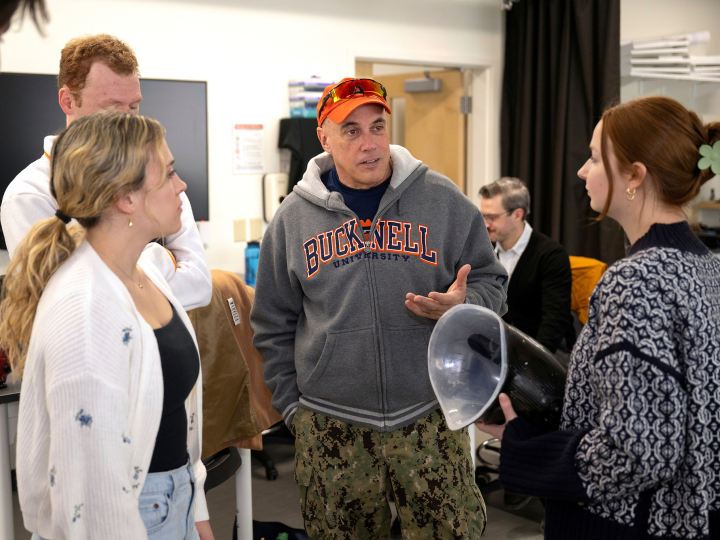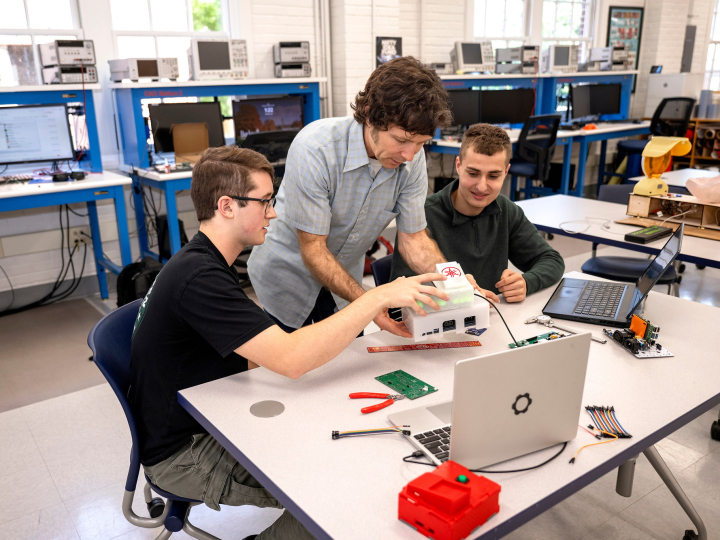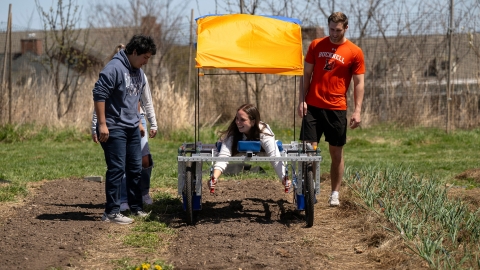
Real Clients, Real Solutions: Bucknell Senior Engineers Make an Impact
May 1, 2025
Alex Padilla '25, Téa Salvatori '25 and Brad Jamison '25 (L–R) are part of an engineering team that created a harvester to improve operations at the Bucknell Farm. Photo by Emily Paine, Marketing & Communications
Each August, as their final year begins, seniors in Bucknell's College of Engineering take what they've learned in the classroom and apply it in a new context. Through the Senior Design capstone course, they team up to tackle real-world challenges for real clients — from major companies like TE Connectivity and Geisinger Health to local partners such as Weis Markets, the Lewisburg Children's Museum and the Bucknell Farm.
The projects span all eight engineering majors, with some teams working within the same discipline and others collaborating across fields to mirror the interdisciplinary nature of professional engineering work.
Senior Design is more than just building a product — it's a structured, exploratory process. Students break down complex problems, communicate with clients, adapt to evolving needs and gain hands-on experience in project management and design thinking.
"Sometimes a client comes in with a clear idea, and students help bring it to life," says Professor Alan Cheville, electrical & computer engineering. "Other times, the students help shape the direction — or even lead the process from the ground up."
As a faculty adviser, Cheville guides his students through a "diverge and converge" design approach, encouraging them to explore multiple solutions before narrowing in on the best one. They use frameworks like NABC — need, approach, benefit/cost ratio, and competition — to evaluate impact and feasibility.
In the process, students gain exposure to both startup-style innovation and the structure of traditional engineering environments. "They may not realize it," Cheville says, "but they're building experience, communication skills and flexibility that will serve them well in their careers."
For Cheville, technical skills are important, but they're only part of the picture. "We want our students to learn how to learn," he says. "They need the agency to take advantage of opportunities that help them live a life they have reason to value."
Designing for Local Impact: The Human-powered Harvester
One team of mechanical engineering majors (Brad Jamison '25, Alex Padilla '25, Téa Salvatori '25 and Angela Ziganshina '25) is partnering with the Bucknell Farm to design a human-powered harvester that eases the physical strain of planting and harvesting. Their goal: reduce back pain for farm workers by creating a more ergonomic and efficient alternative to traditional manual labor.
The students' design process began in August, when they were first introduced to their client, Jen Schneidman Partica, Bucknell's farm and garden manager. What followed was a yearlong cycle of ideation, field testing, prototyping and refinement.
"The fall semester was all about ideating," says Salvatori, who is from Ambler, Pa. "We were figuring out what might work and whether it met all the safety and functionality requirements before moving on to CAD modeling, 3D prototyping and building."
Initially, the team explored three propulsion options: push pumps, hand cranks and a leg-press mechanism. After testing, push pumps were ruled out — they required too much force, often broke down and made alignment difficult. Leg-powered mechanisms also proved too cumbersome. In the end, the students settled on a hand-crank system with customizable handlebars and an adjustable seat, allowing users of different sizes to operate the harvester comfortably.
"One of the most important things was making it adjustable," says Padilla, who is from Atlanta. "People of different heights work at the farm, so we made sure every pad and cushion could shift for comfort and functionality."
The design's evolution was driven by continuous feedback from Partica. The team visited the farm frequently, even helping with planting and transplanting to better understand the labor they were trying to improve.
"The harvester will allow us to increase green bean production, a crop that usually requires hours of stooped work," says Partica. "We've wanted to grow more beans, because they are in high demand at local food pantries. These students are helping us provide more food to local food pantries while making farm work more accessible."
For components like brakes and the drivetrain, students repurposed bike parts but had to redesign the systems from scratch. "We bought two bikes and disassembled them, but the brakes weren't compatible," Padilla says. "We ended up reconfiguring the caliper system to fit our frame and give us more control."
Other design choices, like removable harvesting buckets and a collapsible sunshade, added functionality while keeping the machine simple and human-powered. The team also benchmarked motorized models like the Wonder Weeder, adapting ideas while staying true to the farm's sustainability goals.
The project challenged the students not only as engineers but as project managers and problem-solvers. They set internal milestones, met four times a week, and balanced hands-on fabrication with digital modeling. "The biggest thing I learned was how long the design cycle really is," Salvatori says. "It's never as linear as you think. You're constantly going back and making refinements."
Next steps may include adding steering functionality, as real-world testing revealed that minor turns are needed to navigate slightly uneven crop beds. For now, though, the team is proud of what they've accomplished — a human-powered prototype built from the ground up with comfort, sustainability and usability in mind.
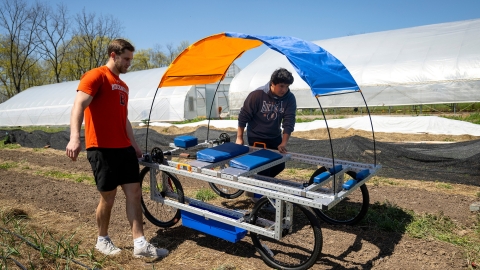
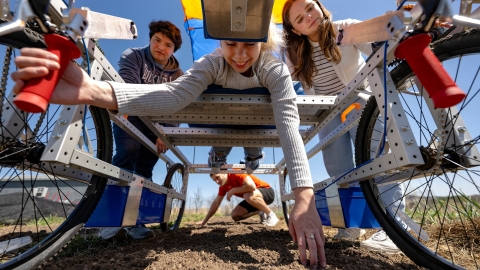
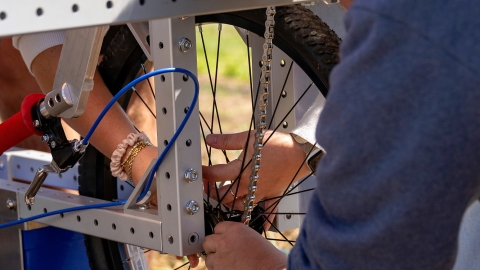
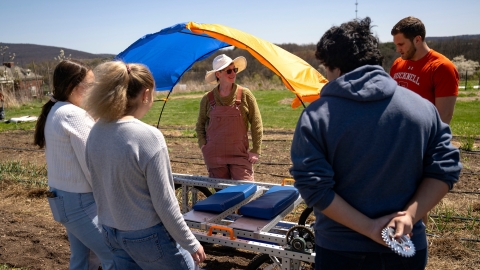
Connecting with Compassion: Tech for Assisted Living
One of the most pressing challenges in health care, especially in elder-care homes, is loneliness. To help address this issue, a Bucknell electrical & computer engineering team (Joe Dox '25, Ben Freedenberg '25, Hunter Gehman '25, Maddy Kalaigian '25, Clea Ramos '25 and Ray Russell '25) partnered with KinNect, a Lewisburg-based startup founded by Paul Smith, to design a simplified video communication system tailored to older adults who often struggle with technology designed for younger users.
Smith initially connected with Bucknell through the University's Small Business Development Center and saw the capstone course as the perfect opportunity to bring his vision to life: a system that can launch video calls with the click of one button, without the need for complex touchscreens.
"It's been magical to watch the students work," Smith says. "They've done real research and brought our concept into a place where it's not just an idea anymore — it's a functioning reality."
In April, the student team deployed their system at RiverWoods Senior Living Community in Lewisburg, where they observed residents interacting with it and gathered direct feedback. They returned to campus with that input and continued refining the product right up to the final days of the semester, ensuring the design remained rooted in real user experience.
Their work has been so impactful that Smith brought in a team of developers to work alongside the students, helping to ensure a smooth transition and full system integration after the students graduate. The students even gained experience working with KinNect's marketing partners, who are preparing to promote the system to additional care facilities. The student team helped explain the functionality and user experience, contributing to the overall positioning of the product.
Ramos, a computer engineering major from Stamford, Conn., who served as the team's project manager, says the experience challenged her in new and valuable ways.
"This was my first time in a formal project management role, and it was a big shift for me," Ramos says. "I had to learn how to balance the technical side with client communication, which was more involved than I expected. It was a crash course in product development and learning how to manage the needs of the client, the user, the workload of the student engineers, and the project itself. It's been a really rewarding challenge."
A Win-Win Experience
For students, Senior Design is a culminating experience that calls for creativity, resilience and collaboration. For partners, it's a chance to gain fresh insights from high-performing students working under the guidance of expert faculty and using state-of-the-art campus resources.
As the academic year wraps up, students will present their projects at the Engineering Design Expo, held from 3–5 p.m. Friday, May 2 in Gerhard Fieldhouse. The event is open to all — it's an opportunity to learn about the innovative projects and impacts the students have achieved.
"It's one thing to learn the theory and technical skills," Ramos. "It's another thing to actually use what we've learned to build something real, something that matters to someone. That's what this experience has been all about."
